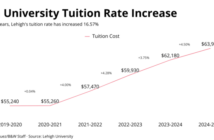President Donald Trump addressed the United Nations General Assembly in New York City on Sept. 19. Members of the Lehigh community watched the broadcast of the speech in the Global Commons in Williams Hall.
Bill Hunter, the director of fellowship advising and U.N. programs, said broadcasting the event highlighted the importance of college students getting the chance to become a part of the bigger world around them.
“Specifically through the U.N. partnership,” Hunter said, “our goal is to take the opportunity to get Lehigh students as close to global decision makers as possible. Any chance we get to get more insight into the U.S. priorities at the U.N., that’s something very valuable to share with the Lehigh students.”
While some members of the Lehigh community watched Trump on television, Matthew Cossel, ’17, watched the speech in person.
“Before President Trump came out, I felt butterflies in my stomach because I’d never seen Trump in person before,” he said. “He’s someone you see on television who gives so many speeches, but watching him in person (was) very powerful. The speech definitely has more weight to it when you hear it in person. It definitely makes you pay attention more.”
Cossel graduated from Lehigh in May and landed an internship as a briefings intern in the United Nations Department of Public Information’s NGO Relations and Advocacy Office. Cossel works with nonprofit organizations that partner with U.N. for various events. He said his main responsibility is working on the team that sets up NGO briefings.
During the week of the General Assembly, NGOs have limited access to the U.N. headquarters, and Cossel’s office had tickets for NGOs to attend the assembly.
Cossel said the reactions of the audience varied at different points of the speech.
“There’s always points in (a U.N.) speech where people clap when they’re supportive of it,” he said. “So there were points in Trump’s speech, when he mentioned initiatives for women and a couple other points where the room actually clapped for what he was saying, but one of the things that was unique about Trump’s speech is that there were points, like the ‘Rocket Man’ comment, where there were actually some snickers.”
Cossel said this showed the divisiveness of Trump’s rhetoric among heads of state.
Students watching the speech at Lehigh had similar reactions.
“As someone who is not an American citizen, but is up-to-date with U.S. politics since several years ago, my thoughts are mixed,” Rommel Aranguren, ’21, said. “I remember during his campaign, I was super against him in the beginning because I had all of the progressive media outlets like Buzzfeed, The Huffington Post and the New York Times that are incredibly biased. When I started to really follow what (Trump) said, I though ‘Hmm, these may not be such bad ideas.’”
However, Aranguren was disappointed with what Trump didn’t say.
“I actually came (to the screening of the speech) because a friend messaged me saying (Trump) was talking about Venezuela, which is my native country,” Aranguren said. “I’m disappointed he hasn’t yet decided to take any military action against the regime in place right now.”
Hunter said Trump “picked sides” during his speech.
“Nations we are clearly aligned with, and others on (Trump’s) hit list,” Hunter said. “It will be interesting to see how they react now, as well.”
The speech was Trump’s first address to the General Assembly, the policymaking sector of the U.N. According to the U.N. website, the General Assembly makes “decisions on important questions, such as those on peace and security, admission of new members and budgetary matters.”
Each country has one vote.
Traditionally, the president of Brazil makes the first speech at the General Assembly and the American president speaks second. Cossel said the U.S. president’s speech typically sets the tone for the week.
Cossel said this year, with the divisiveness of the American election, there was even more excitement over what Trump would say and what policies he would mention.
“There was this crazy amount of nervousness, excitement around his speech,” Cossel said. “There are people who responded directly to Trump in their General Debate speeches. So even more so than normal I feel like the American president was able to dictate the terms of conversation for the General Debate.”
Additional reporting by Cate Peterson, ’18, and Megan Brubaker, ’21.





Comment policy
Comments posted to The Brown and White website are reviewed by a moderator before being approved. Incendiary speech or harassing language, including comments targeted at individuals, may be deemed unacceptable and not published. Spam and other soliciting will also be declined.
The Brown and White also reserves the right to not publish entirely anonymous comments.